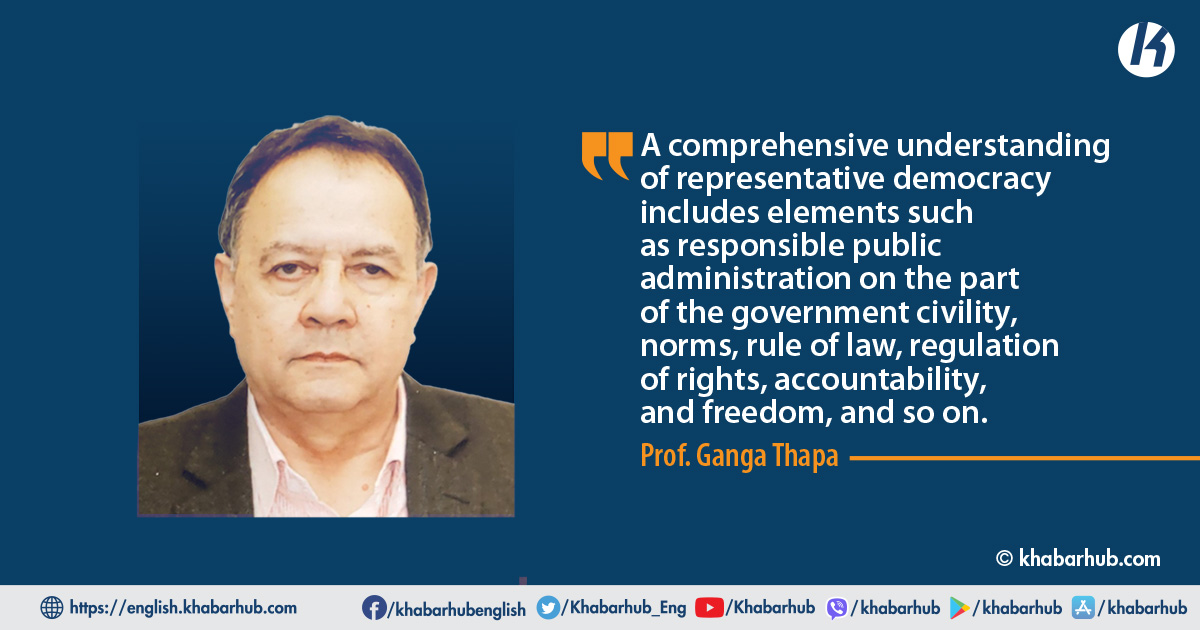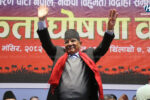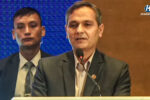KATHMANDU: Gong and Lips (2009) have noted that elections, especially at the national level, constitute a major event for democracy since the government is formed as a result of securing enough votes cast by legitimate voters.
If that is true, one would also agree that the quality of democracy depends on a variety of factors, some of which are achieving economic prosperity, the blossoming of civil society, and getting a liberal political leadership.
We have seen that any political regime type, including democracy, may not be permanent forever, and therefore, it is transformable if not entirely reversible.
Nevertheless, it does point to an important set of factors, especially when an egalitarian regime emerges in a repressive polity that is no longer so strong as to provide collective identity and political opportunities extended by the state, which can be observed in the ‘third wave’ of democratization.
However, if there is a disagreement among scholars on how to proceed with the net positive benefits for its constituents when the ultimate goals are far beyond their capacity, even a simple plurality electoral structure, whose conflicts of interests propel more possibilities that are radical and behavior that is conducive, it may still remain extremely challenging for having a consistently significant impact free from all constraints.
Democracy is hard to love. A comprehensive understanding of representative democracy includes elements such as responsible public administration on the part of the government civility, norms, rule of law, regulation of rights, accountability, and freedom, and so on.
Consider the following scenario: Nepali Congress President Sher Bahadur Deuba had a good chance to appear as a responsible politician while continuing to contribute to the democratization process and economic reforms.
Besides, his Congress Party would have been substantially useful in increasing awareness among diverse sections of the people with an opportunity to map out further progress in the democratization process because sometimes failures prove more instrumental than triumphs unless he hadn’t sold himself out to DLOR, the Dahal-led Oli regime.
This refers to the vote of confidence motion sought by the DLOR that took place – not surprisingly in a highly oligopolistic setting – on 10 January 2023, which showed in reality that the new regime has ventured to aim at capturing overwhelming political and economic powers, while Nepal would continue to suffer from harsh democracy deficit due to the irrelevance of party ideologies, skewed electoral rules, rampant corruption, and vulgar cronyism.
Deuba’s actions reveal his unscrupulous pursuit of self-interest and silly foul play, nondemocratic nonsense, and even a callback of a vulgarized version of his own rule in the late 1990s.
This should not have happened in the first place. With an emasculated title now, Deuba, a supposedly Western puppet, no longer has any credibility and integrity left.
There are a number of parties aligned with the government such as Swatantra, pro-monarchist RPP, and Janamat that tirelessly seem to bargain or begging before the DLOR for resourceful ministries for their members of the national legislature.
Democracy is hard to love. A comprehensive understanding of representative democracy includes elements such as responsible public administration on the part of the government civility, norms, rule of law, regulation of rights, accountability, and freedom, and so on.
True, every society, including those of the West, but three decades of democratic exercise in Nepal is comingled multiple sets of beliefs, fractionalization and fragmentations have found it exceedingly difficult to bring about intended social changes and the development plans have been so ineffective in accomplishing what its leaders and others had so eagerly expected.
On one level, Nepal has failed to alleviate rural poverty, and that is certainly true. The inability of leaders to carry its agenda of institutional reform a new cynicism has crept into political inertia and political change.
It is a known fact that Dahal, Oli, and Deuba are despicable, self-serving, dirty, egoistic, delusive politicians suffering from schezchrophenia and/or megalomania diseases, a kind of mental illness who believe in their own importance or power rather than honesty and responsibility and commitment with the sole purpose of serving, for the people, as they have done and proven in the past.
It’s a great shame that Nepal is now being ruled by a person(s) who had launched an India-sponsored decade-long terrorist movement, the so-called people’s war Janayudhha in Maoist terms, that took seventeen thousand lives of innocent Nepalese, and whose government is now going to be dictated by Khadga Prasad Oli, another notorious criminal politician who beheaded half a dozen human lives and succeeded in making himself a bigger institution than his party, the UML.
Remember, he even remained behind bars for 14 years for his “heroic” deeds (in his own words).
Ok, I may have been slightly overreacting; nevertheless, I have been saying time and again that Nepal is prone to get converted into a bad authoritarian state by limiting or restricting the people’s access to political decision-making structures.
The reason for saying so is that the political system which was designed to protect the common good has already cracked apart in several places.
Transforming vicious circles into a virtuous structure is not going to be easy. Indeed, there is no panacea in sight for a society that is suffering from severe civic anemia, whereas the remedy depends on a correct diagnosis of the problem.
There are a number of parties aligned with the government such as Swatantra, pro-monarchist RPP, and Janamat that tirelessly seem to bargain or begging before the DLOR for resourceful ministries for their members of the national legislature.
But, this inevitably further strengthens the power-centric political culture and subsequently, an increasing flow of patronage and slush money for their survival, which happens to be the familiar pattern of Nepali governance that indicates an even more distressing trend.
Those who still tend to have an optimistic view may well look to many new entrants in the parliament who are now part of the DLOR with a subtle aim to serve their interests that might soon fritter away not only because they have been built around a political boss but because they most likely will get marginalized through a combination of carrots and sticks from their own bosses and will have to face more harassment from big parties such as UML, NC, and Maoists.
Transforming vicious circles into a virtuous structure is not going to be easy. Indeed, there is no panacea in sight for a society that is suffering from severe civic anemia, whereas the remedy depends on a correct diagnosis of the problem.
Even more pertinently, a democratic polity must be based on a strong party apparatus in addition to the realization of a coherent program or ideology that is crucial for shaping the economic structure, addressing the ever-growing concerns, and tackling the problems of corruption and inefficiency that are there virtually in all aspects of the political and economic life of the state that are either ignored altogether or relegated to have least significance.
(Views expressed in this opinion are the writer’s and does not necessarily reflect the editorial stance of Khabarhub)









Comment